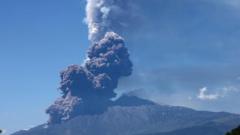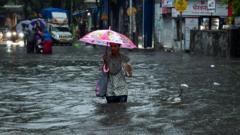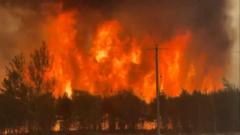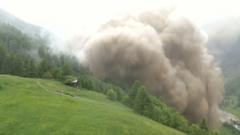Over 17,000 people have evacuated from wildfires in Canada, prompting military assistance and state emergencies in affected provinces. Experts warn that climate change is intensifying fire risks.**
Emergency Evacuations as Wildfires Rage Across Canada**

Emergency Evacuations as Wildfires Rage Across Canada**
Thousands flee amid escalating wildfires in Manitoba and Saskatchewan, as international aid is sought to combat the crisis.**
As wildfires rage across Canada, over 17,000 residents in Manitoba have been forced to evacuate due to rapidly spreading flames. Military support, including aircraft and helicopters, has been mobilized to assist those in remote areas as firefighters struggle to contain the fires. Weather forecasts indicate continued hot and dry conditions, which could exacerbate the situation.
Officials report more than 188 active wildfires affecting large swathes of the country, with states of emergency declared in Manitoba and Saskatchewan, both of which are actively seeking international assistance in battling the fires. Aerial footage reveals massive smoke plumes, indicating the scale of the disaster.
By Saturday, Saskatchewan was home to 17 wildfires, with eight deemed out of control, prompting provincial leaders to urge citizens to prepare for potential escalations in evacuee numbers. Premier Scott Moe emphasized the urgency of the situation, highlighting that the upcoming days are critical for determining the future course of the wildfires.
Compounding the issue, smoke from these wildfires has drifted into parts of the United States, affecting air quality for an estimated 22 million Americans, particularly in northern Minnesota, where warnings have been issued for potentially unhealthy conditions.
In Manitoba, Flin Flon, home to 5,000 residents, is now largely vacant, with only emergency personnel present as 25 active wildfires burn throughout the province—11 of which are classified as out of control. Premier Heather Stefanson notes the unprecedented nature and broad reach of the current crisis.
Forecasts suggest a cold front may arrive, but meteorologist Danielle Desjardins cautions that it may exacerbate windy conditions, further complicating firefighting efforts. Climate experts point to climate change as a significant driver of intense heat, leading to drier conditions conducive to wildfires—a phenomenon increasingly recognized as global temperatures rise.
Canada’s wildfire situation in 2023 marks the worst season on record, with over 42 million acres (approximately 17.3 million hectares) scorched. As the international community watches closely, leaders continue to explore solutions while grappling with the immediacy of summer wildfires fueled by changing climate conditions.





















